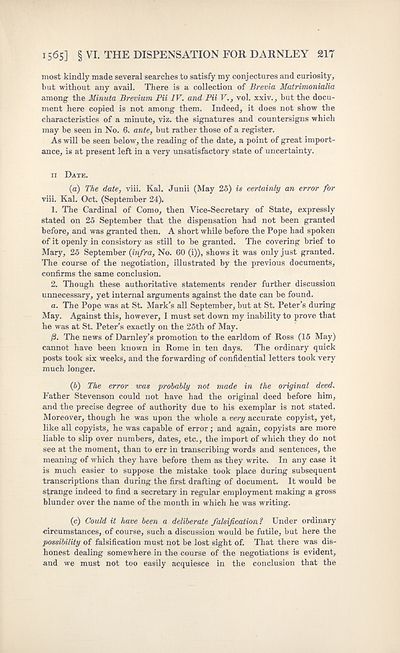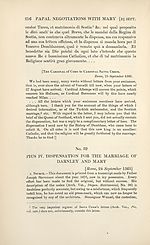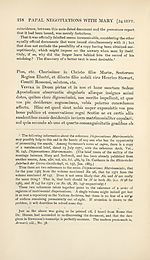Series 1 > Papal negotiations with Mary Queen of Scots during her reign in Scotland, 1561-1567
(366) Page 217
Download files
Complete book:
Individual page:
Thumbnail gallery: Grid view | List view

1565] § VI. THE DISPENSATION FOR DARNLEY 217
most kindly made several searches to satisfy my conjectures and curiosity,
but without any avail. There is a collection of Brevia Matrimonialia
among the Minuta Brevium Pii IV. and Pii V., vol. xxiv., but the docu¬
ment here copied is not among them. Indeed, it does not show the
characteristics of a minute, viz. the signatures and countersigns which
may be seen in No. 6. ante, but rather those of a register.
As will be seen below, the reading of the date, a point of great import¬
ance, is at present left in a very unsatisfactory state of uncertainty.
11 Date.
(а) The date, viii. Kal. Junii (May 25) is certainly an error for
viii. Kal. Oct. (September 24).
1. The Cardinal of Como, then Vice-Secretary of State, expressly
stated on 25 September that the dispensation had not been granted
before, and was granted then. A short while before the Pope had spoken
of it openly in consistory as still to be granted. The covering brief to
Mary, 25 September {infra, No. 60 (i)), shows it was only just granted.
The course of the negotiation, illustrated by the previous documents,
confirms the same conclusion.
2. Though these authoritative statements render further discussion
unnecessary, yet internal arguments against the date can be found.
a. The Pope was at St. Mark’s all September, but at St. Peter’s during
May. Against this, however, I must set down my inability to prove that
he was at St. Peter’s exactly on the 25th of May.
0. The news of Darnley’s promotion to the earldom of Ross (15 May)
cannot have been known in Rome in ten days. The ordinary quick
posts took six weeks, and the forwarding of confidential letters took very
much longer.
(б) The error was probably not made in the original deed.
Father Stevenson could not have had the original deed before him,
and the precise degree of authority due to his exemplar is not stated.
Moreover, though he was upon the whole a very accurate copyist, yet,
like all copyists, he was capable of error; and again, copyists are more
liable to slip over numbers, dates, etc., the import of which they do not
see at the moment, than to err in transcribing words and sentences, the
meaning of which they have before them as they write. In any case it
is much easier to suppose the mistake took place during subsequent
transcriptions than during the first drafting of document. It would be
strange indeed to find a secretary in regular employment making a gross
blunder over the name of the month in which he was writing.
(c) Could it have been a deliberate falsification? Under ordinary
circumstances, of course, such a discussion would be futile, but here the
possibility of falsification must not be lost sight of. That there was dis¬
honest dealing somewhere in the course of the negotiations is evident,
and we must not too easily acquiesce in the conclusion that the
most kindly made several searches to satisfy my conjectures and curiosity,
but without any avail. There is a collection of Brevia Matrimonialia
among the Minuta Brevium Pii IV. and Pii V., vol. xxiv., but the docu¬
ment here copied is not among them. Indeed, it does not show the
characteristics of a minute, viz. the signatures and countersigns which
may be seen in No. 6. ante, but rather those of a register.
As will be seen below, the reading of the date, a point of great import¬
ance, is at present left in a very unsatisfactory state of uncertainty.
11 Date.
(а) The date, viii. Kal. Junii (May 25) is certainly an error for
viii. Kal. Oct. (September 24).
1. The Cardinal of Como, then Vice-Secretary of State, expressly
stated on 25 September that the dispensation had not been granted
before, and was granted then. A short while before the Pope had spoken
of it openly in consistory as still to be granted. The covering brief to
Mary, 25 September {infra, No. 60 (i)), shows it was only just granted.
The course of the negotiation, illustrated by the previous documents,
confirms the same conclusion.
2. Though these authoritative statements render further discussion
unnecessary, yet internal arguments against the date can be found.
a. The Pope was at St. Mark’s all September, but at St. Peter’s during
May. Against this, however, I must set down my inability to prove that
he was at St. Peter’s exactly on the 25th of May.
0. The news of Darnley’s promotion to the earldom of Ross (15 May)
cannot have been known in Rome in ten days. The ordinary quick
posts took six weeks, and the forwarding of confidential letters took very
much longer.
(б) The error was probably not made in the original deed.
Father Stevenson could not have had the original deed before him,
and the precise degree of authority due to his exemplar is not stated.
Moreover, though he was upon the whole a very accurate copyist, yet,
like all copyists, he was capable of error; and again, copyists are more
liable to slip over numbers, dates, etc., the import of which they do not
see at the moment, than to err in transcribing words and sentences, the
meaning of which they have before them as they write. In any case it
is much easier to suppose the mistake took place during subsequent
transcriptions than during the first drafting of document. It would be
strange indeed to find a secretary in regular employment making a gross
blunder over the name of the month in which he was writing.
(c) Could it have been a deliberate falsification? Under ordinary
circumstances, of course, such a discussion would be futile, but here the
possibility of falsification must not be lost sight of. That there was dis¬
honest dealing somewhere in the course of the negotiations is evident,
and we must not too easily acquiesce in the conclusion that the
Set display mode to:
![]() Universal Viewer |
Universal Viewer | ![]() Mirador |
Large image | Transcription
Mirador |
Large image | Transcription
Images and transcriptions on this page, including medium image downloads, may be used under the Creative Commons Attribution 4.0 International Licence unless otherwise stated. ![]()
| Scottish History Society volumes > Series 1 > Papal negotiations with Mary Queen of Scots during her reign in Scotland, 1561-1567 > (366) Page 217 |
|---|
| Permanent URL | https://digital.nls.uk/126975525 |
|---|
| Attribution and copyright: |
|
|---|
| Description | Over 180 volumes, published by the Scottish History Society, containing original sources on Scotland's history and people. With a wide range of subjects, the books collectively cover all periods from the 12th to 20th centuries, and reflect changing trends in Scottish history. Sources are accompanied by scholarly interpretation, references and bibliographies. Volumes are usually published annually, and more digitised volumes will be added as they become available. |
|---|


